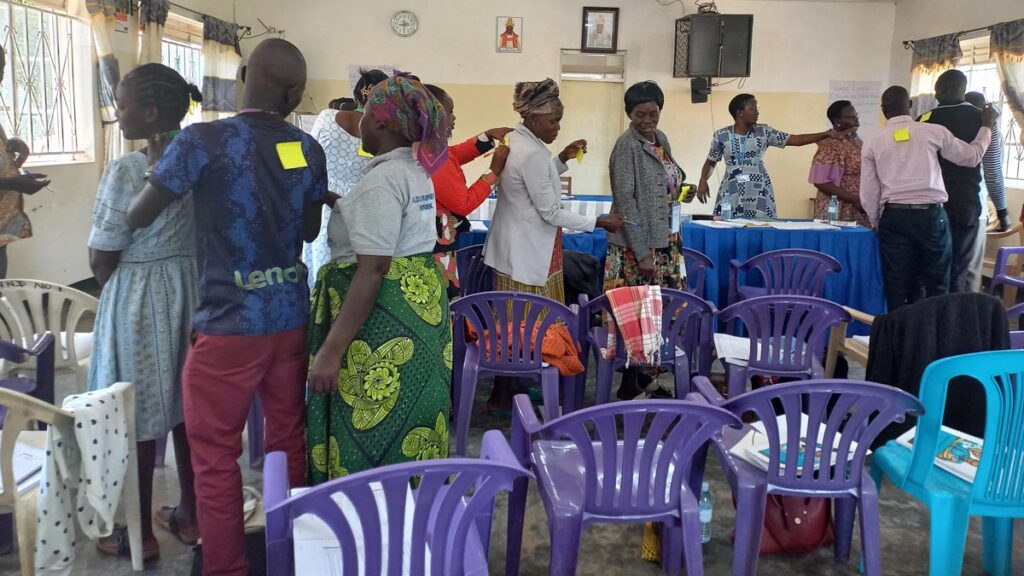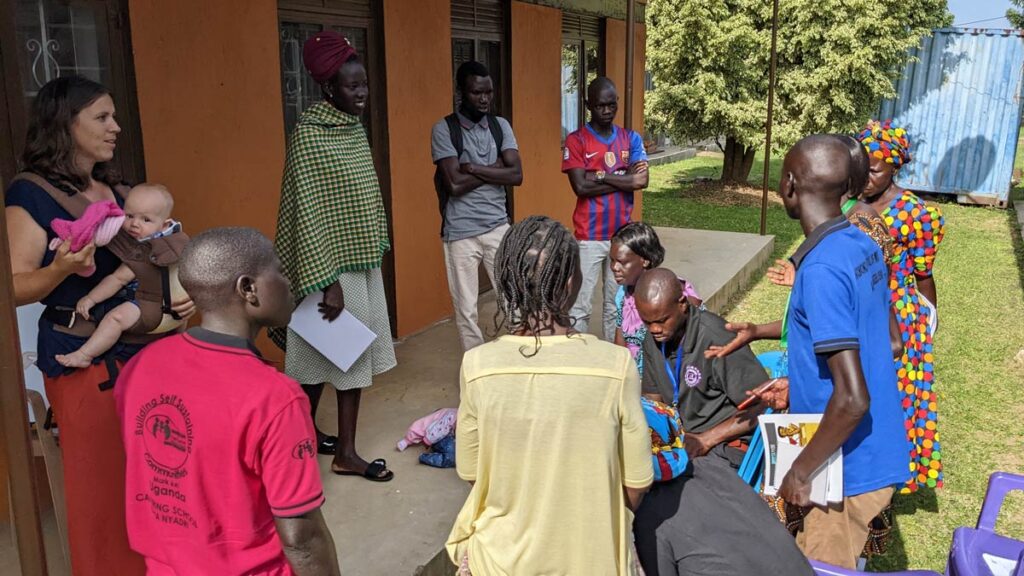The Woman at the Gate
Tom and Verity Clare reflect on healthcare and discipleship for people at the edges in north-west Uganda
Photo: Newly accredited trainers for a life skills and reproductive health course (Tom and Verity Clare/Church Mission Society)
From Arua, Uganda, mission partners Tom and Verity Clare offer candid reflections on what it’s like to get overwhelmed by need. They also consider the holistic nature of their calling: healthcare and discipleship for people at the edges. Like *Grace and Robert.
It’s 5am and I’ve given up on sleep after a night full of storms – thunder that makes you jump up awake in bed, lightning that illuminates the whole house and the noise of the rain drumming on the iron roof sheets is far from soporific. Yet we are grateful to be here in Uganda in the cooler, rainy season.
A course in wise choices
The rain is just one of the many things we have to be thankful for here in Arua. One particular highlight of this season has been a life skills and reproductive health course we recently ran at the diocese, inviting two participants from each of the 12 archdeaconries to attend.
The course, called Wise Choices for Life Training of Trainers, is Bible-based and covers topics such as critical thinking, relationship skills, puberty, planning a family, having a baby and cultural traditions and myths.

Reproductive health is an area of teaching that can often slip through the cracks here in Uganda, with schools, churches and family members passing on responsibility to each other. The course aims to break the cycle of poverty that is perpetuated by inexperience in these matters, which leads to unplanned pregnancies, large families and high rates of maternal death.
Grace at the gate
A couple of days after the course finished, a young lady turned up at our gate, carrying a bundle of her belongings, her nearly two-year-old son and a two-week-old baby. We had met Grace* a couple of times previously and she is a perfect example of why this training is so badly needed in the community.
In our first year here, a man called Robert* would deliver us fresh milk a few times a week. Robert came from another part of Uganda and was rejected by his Muslim family when he converted to Christianity.
He had some interesting ideas about the Christian faith and one day he told us he’d found a wife. It turns out that he’d actually met a girl through his church, she’d become pregnant and they were now living together.
Two years on and Grace turns up at our gate, having been kicked out of her aunt’s house in the middle of the night. She said she had nowhere else to go. Her mother died of HIV when she was 10 years old, her father has severe mental health problems and she’s estranged from her half-sister. Robert had disappeared in July without informing his pregnant wife – his story, when we got hold of him, was that he’d left to go to Bible college.

Holding that tiny, unclothed two-week-old baby in my arms, bundled up in blankets, while his mum bathed his brother and dressed them both in some of our children’s old clothes, my heart broke. What kind of life did this baby have before him?
We found somewhere for them to stay for a couple of nights and tried to find a way to get Grace back to her family. Unfortunately, Robert and Grace had also become involved in a para-Christian cult and although Robert had previously refused to take Grace’s calls, he then became adamant that she go and stay with their pastor on the other side of town.
A familiar story
Grace is a lovely lady – only 20 years old – but the consequences of growing up in a broken family, desperate for security and longing to be loved, have led her to the situation she’s in now.
Her story is far from uncommon and sometimes we can feel overwhelmed by the level of physical, emotional and spiritual needs here.
What we were able to do for Grace – sitting with her, giving her a little food, a place to stay and clean clothes as relief in her desperation, felt somewhat pathetic in terms of the scale of her needs in the long term, but I was reminded of a couple of passages in the Bible that brought some encouragement: Matthew 25:35–36 and also the following verses, from Isaiah 58:6–7:
Is not this the kind of fasting I have chosen:
to loose the chains of injustice
and untie the cords of the yoke,
to set the oppressed free
and break every yoke?Is it not to share your food with the hungry
and to provide the poor wanderer with shelter –
when you see the naked, to clothe them,
and not to turn away from your own flesh and blood?
We are thankful that God has called us to be part of his mission in this part of the world. I can often pray the big prayers of verse 6, forgetting that the actions in verse 7 are part of the answer to these prayers. Grace and Robert’s story reminds us of the holistic nature of our calling. The need for discipleship and Bible teaching alongside practical help and training.
It can be difficult to ever feel that you’ve fully met someone’s needs and sometimes we just have to pray and entrust people to God’s care. We know that we serve a God who is not a stranger to these kinds of situations, who humbled himself and came down into the messes of this world.
*names changed